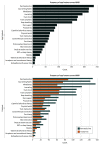Assessment of Mental Health Services Available Through Smartphone Apps
- PMID: 36576737
- PMCID: PMC9857226
- DOI: 10.1001/jamanetworkopen.2022.48784
Assessment of Mental Health Services Available Through Smartphone Apps
Abstract
Importance: As more patients and clinicians are turning to mental health smartphone apps to expand access to services, little is known about the current state of the app marketplaces and what these apps are actually offering in terms of features, privacy, price, and services.
Objective: To assess the current state of mental health apps, explore the association between app privacy scores and popularity as measured by star ratings and downloads, and to understand opportunities and challenges facing the commercial app landscape.
Design, setting, and participants: This cross-sectional study had trained raters using the public-facing M-Health Index and Navigation Database (MIND) to assess and review 578 mental health apps. The sample of apps used in this analysis were pulled from MIND and include apps across various conditions including schizophrenia, eating disorders, sleep, and more. Analysis of these apps was conducted in June 2022.
Exposures: There were 578 mental health apps rated across 105 dimensions derived from the American Psychiatric Association's app evaluation framework.
Main outcomes and measures: App raters assessed each app across 6 categories: (1) app origin and accessibility, (2) privacy and security, (3) clinical foundation, (4) features and engagement, (5) inputs and outputs, and (6) interoperability. Privacy scores were determined by 5 MIND criteria, including (1) having a privacy policy, (2) reporting security measures in place, (3) declaring data use and purpose, (4) allowing for the deletion of data, and (5) allowing users to opt out of data collection. Correlations between privacy scores and popularity metrics (star ratings and number of downloads) were measured.
Results: This study included 578 mental health apps that were identified, assessed, and analyzed across 105 MIND dimensions. Psychoeducation, goal setting, and mindfulness were among the top app features. Of the 578 apps analyzed, 443 (77%) had a privacy policy. This analysis of apps with a privacy policy revealed that there was no statistically significant correlation between privacy scores and Apple App Store (r = 0.058, P = .29) or Google Play Store star ratings (r = 0.041; P = .48). The number of app downloads on the Google Play Store, however, was weakly correlated with privacy scores (χ25 = 22.1; P < .001).
Conclusions and relevance: In this cross-sectional study of mental health apps, findings indicate that the current app marketplaces primarily offered basic features such as psychoeducation, goal tracking, and mindfulness but fewer innovative features such as biofeedback or specialized therapies. Privacy challenges remained common, and app popularity metrics provided little help in identifying apps with more privacy.
Conflict of interest statement
Figures



Similar articles
-
Smartphone Apps for Smoking Cessation: Systematic Framework for App Review and Analysis.J Med Internet Res. 2023 Jul 13;25:e45183. doi: 10.2196/45183. J Med Internet Res. 2023. PMID: 37440305 Free PMC article. Review.
-
Assessing mental health apps marketplaces with objective metrics from 29,190 data points from 278 apps.Acta Psychiatr Scand. 2021 Aug;144(2):201-210. doi: 10.1111/acps.13306. Epub 2021 Apr 29. Acta Psychiatr Scand. 2021. PMID: 33835483
-
Systematic assessment of the quality and integrity of popular mental health smartphone apps using the American Psychiatric Association's app evaluation model.Front Digit Health. 2022 Sep 29;4:1003181. doi: 10.3389/fdgth.2022.1003181. eCollection 2022. Front Digit Health. 2022. PMID: 36246848 Free PMC article.
-
Assessment of Smartphone Apps for Common Neurologic Conditions (Headache, Insomnia, and Pain): Cross-sectional Study.JMIR Mhealth Uhealth. 2022 Jun 21;10(6):e36761. doi: 10.2196/36761. JMIR Mhealth Uhealth. 2022. PMID: 35727625 Free PMC article.
-
mHealth Solutions for Perinatal Mental Health: Scoping Review and Appraisal Following the mHealth Index and Navigation Database Framework.JMIR Mhealth Uhealth. 2022 Jan 17;10(1):e30724. doi: 10.2196/30724. JMIR Mhealth Uhealth. 2022. PMID: 35037894 Free PMC article.
Cited by
-
Mental Health Monitoring for Young People Through Mood Apps: Protocol for a Scoping Review and Systematic Search in App Stores.JMIR Res Protoc. 2024 Nov 19;13:e56400. doi: 10.2196/56400. JMIR Res Protoc. 2024. PMID: 39561357 Free PMC article.
-
Rethinking and reclaiming psychiatry.Indian J Psychiatry. 2025 Feb;67(2):181-191. doi: 10.4103/indianjpsychiatry.indianjpsychiatry_107_25. Epub 2025 Feb 19. Indian J Psychiatry. 2025. PMID: 40181880 Free PMC article. No abstract available.
-
Current evidence on the efficacy of mental health smartphone apps for symptoms of depression and anxiety. A meta-analysis of 176 randomized controlled trials.World Psychiatry. 2024 Feb;23(1):139-149. doi: 10.1002/wps.21183. World Psychiatry. 2024. PMID: 38214614 Free PMC article.
-
Integrated Digital Mental Health Care: A Vision for Addressing Population Mental Health Needs.Int J Gen Med. 2024 Feb 1;17:359-365. doi: 10.2147/IJGM.S449474. eCollection 2024. Int J Gen Med. 2024. PMID: 38318335 Free PMC article.
-
Renin-angiotensin system as an emerging target to modulate adult neurogenesis in health and disease.Stem Cell Res Ther. 2025 Jul 1;16(1):332. doi: 10.1186/s13287-025-04430-2. Stem Cell Res Ther. 2025. PMID: 40598350 Free PMC article. Review.
References
Publication types
MeSH terms
LinkOut - more resources
Full Text Sources
Research Materials

